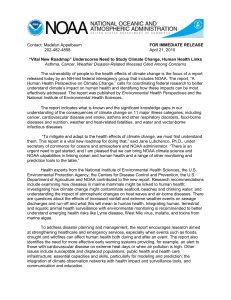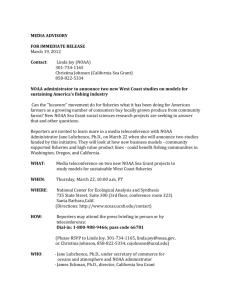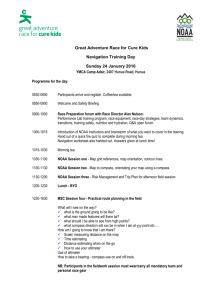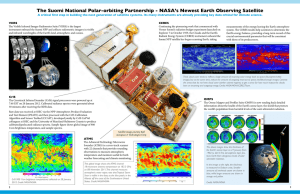The use of temperature and water vapor
advertisement
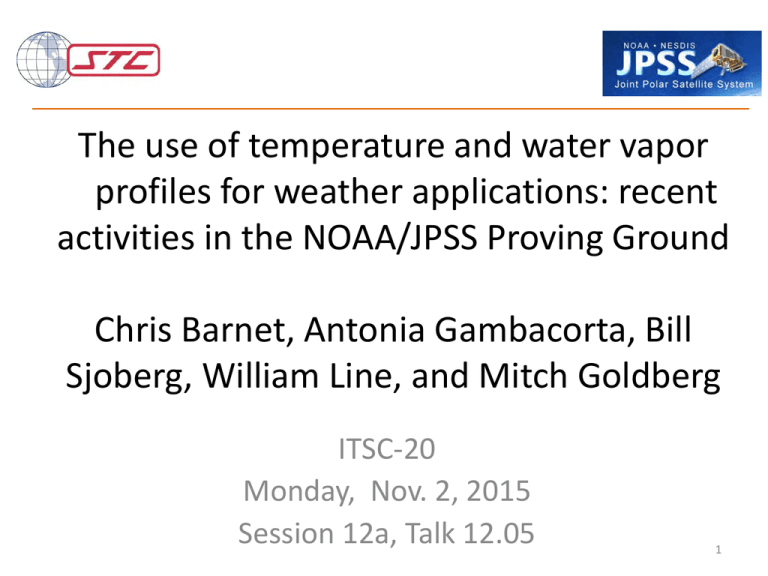
The use of temperature and water vapor profiles for weather applications: recent activities in the NOAA/JPSS Proving Ground Chris Barnet, Antonia Gambacorta, Bill Sjoberg, William Line, and Mitch Goldberg ITSC-20 Monday, Nov. 2, 2015 Session 12a, Talk 12.05 1 NOAA/JPSS Application Team Initiatives for Sounding • Motivation – Primary goal is to promote new applications. – Secondary goal is to encourage interaction between developers and users to tailor soundings to applications • We currently have a number of active initiatives for sounding 1. Hydrometeorology Testbed (HMT): Atmospheric Rivers 2. Aviation Weather Testbed (AWT): Cold Air Aloft 3. AWIPS-II NUCAPS and training module & improvements 4. Hazardous Weather Testbed (HWT): Convective Initiation 5. NUCAPS Trace Gas Product Evaluation 6. Evaluation of products in NWP model applications 2 Initiative #1 / 5 Hydrometeorology Testbed: CalWater-2015 POCs: Chris Barnet (JPSS) & Ryan Spackman (NOAA/ESRL/PSD) 3 CalWater-2015 time line • Campaign ran from Jan. 12 to Feb. 25 – Scientific goal: improve forecasting of atmospheric rivers and their impact on west coast USA hydrology • We used CSPP direct broadcast (DB) CrIS and ATMS data from Corvallis Oregon station – Used data to produce soundings with NUCAPS – Provided forecasters the Pacific am overpass • Considered in 7 am local time (LT) flight planning meeting – Provided scientists in aircraft the pm overpass • Allowed modification to dropsonde distribution • Also used Univ. of Hawaii DB later in mission 4 NUCAPS sees “snapshot” of entire field campaign domain • NUCAPS 2200 km wide “scanset” is acquired in 8 seconds • “scanset” is 30 retrievals with spatial resolution of ~50 km at nadir • • Retrievals reveal structures many hours in advance of a model analysis (i.e., CrIS/ATMS have not been ingested) Differences shown at in lower panels could be due to retrieval errors or GFS errors NUCAPS Microwave RH Retrieval cross section along scanset shown as blackline in top left figure. Insensitive to nonprecipitating clouds NUCAPS Microwave + Infrared RH retrieval along same scanset. More sensitive to clouds but higher vertical resolution GFS TPW Feb. 6, 2015 GFS RH cross section (along scanset indicated on top left NUCAPS Microwave retrieval – GFS NUCAPS Microwave + Infrared retrieval – GFS 5 What JPSS program gained from CalWater 2015 • CalWater-2015 was an opportunity for NUCAPS product validation – Over 435 dropsondes were acquired – Test NUCAPS in extreme weather that is of national and societal interest • As algorithm developers, we need these kinds of scenes to improve the retrieval skill and tailor the quality control. – Can test experimental versions of NUCAPS – Gain the expertise of the entire CalWater science team to characterize the underlying science and meteorology. – Other in-situ measurements (CO, O3, CO2, aerosols) will help the NUCAPS validation, – Demonstrate the value and shortcomings of NUCAPS in the field Date G-IV 1/15 25 1/17 29 1/22 13 1/24 23 P-3 1/27 22 1/31 24 2/5 35 2/6 30 2/7 2/8 7 9 32 2/9 16 2/14 41 2/19 37 2/20 35 2/22 30 2/24 35 total 365 6 78 Example of Feb. 6 dropsondes • NOAA Gulfstream (G-IV) did a sawtooth pattern across the AR • NPP Overpass occurred between sondes #19 and #20 • Capture pre-AR, AR, and post-AR regimes on 4 crossings • Pre-AR is relatively warm and dry • AR is wet, cloudy, warm, and most likely raining • Post-AR is wet and cooler • NOAA P-3 was flying at 800 mb • Sampling same region as G-IV • ~4 hours later 7 Dropsonde and retrieval cross section along flight Transect 1 Transect 2 Transect 3 Micro-wave only Transect 4 Regression first guess 11/12/2015 MW+IR (final) retrieval Gambacorta et al. 8 Initiative #2 / 5 Aviation Weather Testbed: Cold Air Aloft See Nadia Smith’s poster 4p.04 for additional information POC: Brad Zavodsky (NASA/SPoRT), Kristine Nelson (NWS/AR/ARS/CWSU/ANCHORAGE AK) 9 Aviation Weather Testbed Cold Air Aloft In Alaska, forecasters must rely on analysis and model fields and limited radiosonde observations (~4/day) to determine the 3D extent of the cold air aloft – Airline fuel begins to freeze below -65 degC, need to issue pilot advisories – Forecasters need to know spatial and vertical location of “bubble” of cold air aloft • • Anchorage Flight Information Area (FIR) encompasses 2.4 square million miles Anchorage Airport was ranked 3rd worldwide for throughput cargo (90% of China to USA) and 1st in the USA for cargo poundage (5.9 Billion lbs) 10 Daily Cold Air Loft frequency of occurrence at 190 mbar Used AIRS Level.2 Support Product Counted occurrences of T(190mb) ≤ -65 degC in a 1x1 deg grid Anchorage Center Weather Service Unit (CWSU) issued warnings on Nov. 11th to 14th Analysis and graphics by C. Francoeur, STC Summary of Aviation Weather initiative • CrIS/ATMS easily sees the cold air aloft in our cross-sections and skew-T plots – Product has +/- 4 K differences f/GFS and is smoother • Vertical location can differ by ± 2000 feet (± 0.7 km) • Goal is to work with Alaska AWT/CWSU to develop better visualization of cold air aloft • Forecasters can account for biases • GFS ingests CrIS and ATMS, is it good enough? – At 200 mbar many CrIS channels/scenes are used – Real time NUCAPS (8, 9.5, 11 and 20, 21.5, 23 Z) adds information between the model analysis times (0, 6, 12, 18Z) and gives forecaster more confidence 12 Initiative # 3 / 5 AWIPS-II NUCAPS training module & AWIPS improvements POCs: Brian Motta (NWS), Scott Lindstrom (CIMSS) 13 AWIPS-NUCAPS training module and improvements • NUCAPS is now available in AWIPS-II – AWIPS-II is visualization tool in USA forecast offices • Articulated training modules can be viewed at: – https://www.youtube.com/watch?v=U-w6EBnOzb0 – Describes that soundings are smoother than RAOBS – Illustrates how to modify NUCAPS to local conditions • Forecasters have now asked for improved visualization – AWIPS “Plan View” and “Volume Browser“ displays • We learned that forecasters always make corrections soundings. – led to a new JPSS initiative (PI: Dan Lindsay, CIRA) to automate the correction process 14 Initiative #4 / 5 Hazardous Weather Testbed: 2015 Spring Experiment • • • Norman, Oklahoma (OK Univ./NOAA Facility) 5 NWS forecasters and 1 broadcaster per week (30 total; and PI’s) 5 weeks in May and June, 2015 15 Example Blog Post: “West Texas Soundings” May 19 – Midland, TX 12Z MAF RAOB “The drying of the air at 600-800 mb since 12Z is reflected by intermediate NUCAPS soundings.” 00Z MAF RAOB 19Z NUCAPS near MAF Even if magnitude is off, drastic change and trend is significant & useful! “The NUCAPS soundings are a good way to see changes in the airmass since the RAOB soundings have been taken.” Feedback from the 2015 HWT Spring Experiment All participants answered that they understand the differences between space-based soundings and RAOBs Blog: http://goesrhwt.blogspot.com/search/label/NUCAPS “Tales” webinars: http://hwt.nssl.noaa.gov/ewp/ Final Report: Coming soon 5% 28% 28% 30% 8% 74% Daily Survey Q 26% Daily Survey Q Initiative #5 / 5 NUCAPS Trace Gas Product Evaluation POCs: Greg Frost (NOAA/ESRL/GSD), Brad Pierce (NOAA/STAR) 18 NUCAPS Trace Gas Product Evaluation • Initiative is based on 2 recently funded JPSS proposals. 1. Greg Frost: “Understanding emissions and tropospheric chemistry using NUCAPS and VIIRS” 2. Brad Pierce: “High Resolution Trajectory-Based Smoke Forecasts using VIIRS Aerosol Optical Depth and NUCAPS Carbon Monoxide Retrievals “ • Models are used to interpolate the sparse aircraft observations to the satellite temporal, spatial, and vertical sampling characteristics for detailed validation • NUCAPS (and AOD f/ VIIRS) will be used within IDEA (Infusing Satellite Data into Envir. AQ Applications) http://www.star.nesdis.noaa.gov/smcd/spb/aq/ 19 NUCAPS Trace Gas Product Evaluation • We selected two field campaigns – Senex: http://www.esrl.noaa.gov/csd/projects/senex • Senex ≡ Southeast Nexus • Summer 2013, SE USA • Focus on methane emissions associated with wildfires. – Songex: http://esrl.noaa.gov/csd/projects/songnex/ • Songex ≡ Shale Oil and Natural Gas Nexus • Spring 2014, Northwest USA • Begin with NUCAPS Carbon Monoxide – Requires full spectral resolution CrIS data – Use experimental version of NUCAPS • Also, methane emissions from oil and gas • Recent wildfire activity in western USA 20 Future Plans for NUCAPS and The Path Forward 21 Future Plans The way forward • Metop-A & B NOAA IASI/AMSU/MHS retrievals into AWIPS-II – Same algorithm as NUCAPS, but 4 hours earlier • Metop-A & B NOAA IASI/AMSU/MHS retrievals into CSPP direct broadcast – In work, should be operational in mid-2016 • Unfortunately, AIRS is not in the operational flow at NOAA (it is a NASA product) – We are considering putting it into CSPP (FY2017) 22 Constellation of satellites allows more observations between 0Z & 12Z RAOBS NPP/J-1 will be phased similar to Metop-A/B approx. 6 months after launch of J-1 (Used Aqua as proxy for J-1 in plot) These are overpasses with satellite elevation > 32 deg (all FOR’s) Day of June, 2015 23 A number of funded initiatives with a NWS modeling focus • Much of the NUCAPS retrieval skill comes from use of cloud cleared radiances (CCRs) – Jun Li (CIMSS) is doing a study of using NUCAPS CCRs • Hindsight analysis of H. Sandy (2012) and Typhoon Haiyan (2013) – Andrew Collard (NCEP) looking at using our algorithm directly (compute CCRs from CrIS radiances using model background) • Emily Berndt (SPoRT) investigation of NUCAPS T(p), q(p), and O3(p) to study extratropical transition of hurricanes – create an enhanced stratospheric depth product – conduct a product demonstration and assessment with the NHC, WPC, OPC forecasters • Galina Chirokova (CIRA) will investigate use of VIIRS and NUCAPS to improve moisture flux estimates. – Detection of dry air intrusions are important for TC forecasting 24 QUESTIONS? 25 Acronyms – – – – – – – – – – – – – – – – – – – – – – AIRS = Atmospheric Infrared Sounder AMSU = Advanced Microwave Sounding Unit AR = Atmospheric River ATMS = Advanced Technology Microwave Sounder AVHRR = Advanced Very High Resolution Radiometer AWIPS = Advanced Weather Interactive Processing System AWT = Aviation Weather Testbed CrIS = Cross-track Infrared Sounder CIMMS = Cooperative Institute for Mesoscale Meteorological Studies CIMSS = Cooperative Institute for Meteorological Satellite Studies CSPP = (CIMSS) Community Satellite Processing Package CWA = (NWS) County Warning Area CWSU = (FAA) Center Weather Service Unit EUMETSAT = EUropean organization for exploitation of METeorological SATellites FOV/FOR = Field Of View/Regard GFS = (NCEP) Global Forecast System GSFC = (NASA) Goddard Space Flight Center HMT = Hydrometeorology Testbed HSB = Humidity Sounder Brazil HWT = Hazardous Weather Testbed IASI = Infrared Atmospheric Sounding Interferometer JPSS = Joint Polar Satellite System – – – – – – – – – – – – – – – – – – – – – – – METOP = METeorological Observing Platform MHS = Microwave Humidity Sensor MODIS = MODerate resolution Imaging Spectroradiometer NASA = National Aeronautics and Space Administration NCEP = National Centers for Environmental Prediction NESDIS = National Environmental Satellite, Data, and Information Service NHC = (NCEP) National Hurricane Center NOAA = National Oceanographic and Atmospheric Administration NPP = National Polar-orbiting Partnership NWP = Numerical Weather Prediction NWS = National Weather Service NUCAPS = NOAA Unique CrIS/ATMS Processing System OPC = (NCEP) Ocean Prediction Center OSPO = (NESDIS) Office of Satellite and Product Operations SOO = Science Operations Officer SPC = (NCEP) Storm Prediction Center SPoRT = (NASA) Short-term Prediction and Research Transition Center STAR = (NESDIS) SaTellite Applications and Research STC = Science and Technology Corporation UMBC = University of Maryland, Baltimore County VIIRS = Visible Infrared Imaging Radiometer Suite WFO = (NWS) Weather Forecast Office WPC = (NCEP) Weather Prediction Center 26 NUCAPS sees entire field campaign domain (single frame) • • • • NUCAPS 2200 km wide “scanset” is acquired in 8 seconds 30 retrievals with spatial resolution of ~50 km at nadir and ~70x134 km at edges of scan In many cases these retrievals reveal structures many hours in advance of a model analysis (i.e., CrIS/ATMS have not been ingested) Differences shown at in lower panels could be due to retrieval errors or GFS errors NUCAPS Microwave RH Retrieval cross section along scanset shown as blackline in top left figure. Insensitive to nonprecipitating clouds NUCAPS Microwave + Infrared RH retrieval along same scanset. More sensitive to clouds but higher vertical resolution GFS TPW Feb. 6, 2015 GFS RH cross section (along scanset indicated on top left NUCAPS Microwave retrieval – GFS NUCAPS Microwave + Infrared retrieval – 27 GFS Daily Cold Air Loft frequency of occurrence (single frame) Used AIRS Level.2 Support Product Counted occurrences of T(190mb) ≤ -65 degC in a 1x1 deg grid Anchorage Center Weather Service Unit (CWSU) issues warnings on Nov. 11th to 14th Analysis and graphics by C. Francoeur, STC Constellation of satellites allows more observations between RAOBS NPP/J-1 will be phased similar to Metop-A/B approx. 6 months after launch of J-1 If we included NOAA AMSU/HIRS there would be even more soundings These are overpasses with satellite elevation > 45 deg (FOR 4-27) Day of June, 2015 29
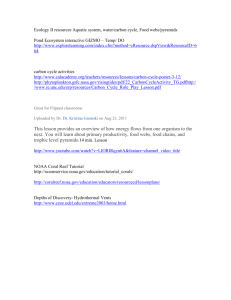
![Eduardo A. Araujo-Pradere [], CIRES, University of Colorado, Solar Minimum](http://s2.studylib.net/store/data/013086460_1-158f16f4991b8d654a2183bbdcda9c6c-300x300.png)
